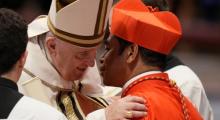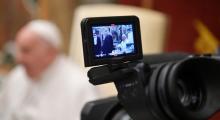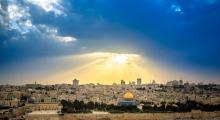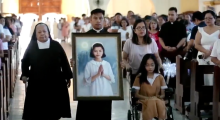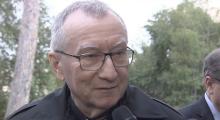Issued by the Catholic Center for Studies and Media - Jordan. Editor-in-chief Fr. Rif'at Bader - موقع أبونا abouna.org
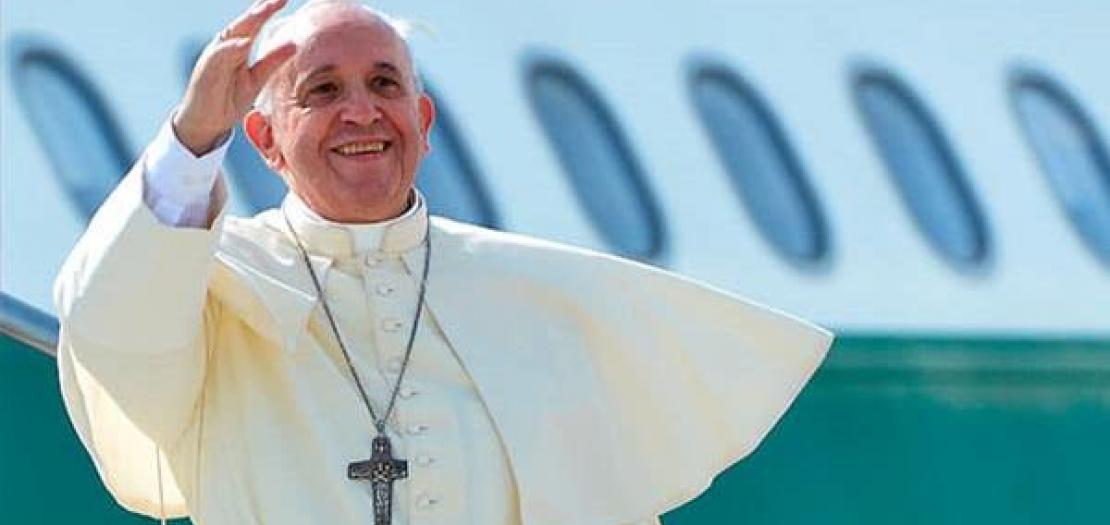
The announcement of Pope Francis’ trip to Cyprus took the small Cypriot Catholic Church by surprise, with its merely 30,000 Latin and Maronite faithful. Despite little time to prepare, Polish Franciscan Fr. Jerzy Kraj of Krakow, in his sixties, doesn’t hide his enthusiasm.
In this wide-ranging, exclusive interview with Exaudi, he says: “It will be a sign of closeness to communities in difficulty, a surprising message of God for those that want peace and dialogue.”
Francis will land in Cyprus, ancient country of Orthodox Tradition with a small Muslim minority, the afternoon of Thursday, December 2, and will leave on Saturday morning for Athens. “Francis is coming as teacher and also as disciple,” said Father Kraj. “The Church he will meet is made up in the main of foreign immigrants. However, the most urgent pastoral challenge is the North of Cyprus, where no Catholic priest resides.
In this interview, Father Kraj tells her about the variegated provenances of Cyprus’ Catholics, the not always easy dialogue with the Orthodox Church and about the painful division of the Island between the Turkish-Cypriot North and the Greek-Cypriot South.
Here is their conversation:
Exaudi: Father Kraj, what does Pope Francis’ visit to Cyprus mean for the local Catholic Church and for the country?
Father Kraj: The announcement of the Pope’s trip to Cyprus was a surprise for me and for all. We didn’t believe that after Benedict XVI’s trip in 2010, another Pope would come to a small Island after only 11 years, and this says a lot about Francis’ spirit, who has chosen to come to Cyprus because it’s a periphery, not only geographic but also existential. This is surely a sign of closeness to the communities in difficulty.
Exaudi: And what are the difficulties of the Catholic Church in Cyprus?
Father Kraj: We speak of difficulties not only as Church, but also difficulties of relations with the outside, regarding ecumenism, the reality of migrants and especially Cyprus’ division in two parts. Nicosia is the last capital of Europe still divided by a wall. Hence, the Pope’s arrival is a sign, a surprising message of God to all those that want to plan and carry forward a project of peace and dialogue.
Exaudi: In your opinion, what will be the most important and meaningful moments of his program?
Father Kraj: In synthesis, the program includes four solemn moments, beginning with the first meeting with the local Maronite Church. I would like to stress the value of synodality, be it in this first meeting with the Maronites, namely, priests, Religious, consecrated and Ecclesial Movements, be it in the second meeting with the Latin Church, in the Holy Cross parish. In fact, on both occasions there will be two testimonies to listen to, to have the message of our reality reach Francis. This pleases me a lot, especially the fact that the Pope is not coming only to teach but also to learn. Francis is arriving in Cyprus as teacher but also as disciple, as pastor and disciple of Church. The Pope will bring us encouragement, it’s very important to stress this: you know that the trip’s motto is “comforting each other in faith,” which in Italian has been translated officially as “consoling us in the faith,” but the Holy See’s Press Office made a mistake in the translation. It’s not “consoling us in the faith, but “let us console one another in the faith.” This point is important: the Pope will bring us a message that not only we must receive, but we must also live it and take it to others.
Exaudi: Could you tell me more about the other three meetings?
Father Kraj: In regard to that in the Catholic parish of the Holy Cross, there will be an ecumenical prayer in the presence of the immigrant communities, the culminating point of the trip, the evening before his departure. Then there will be the meeting with the local Orthodox Church, with Archbishop Chrysostom II in the Orthodox Arch-Episcopate with the Orthodox Synod in Saint Barnabas’ church, inaugurated last June 11, where the Pope will undoubtedly receive a beautiful welcome and also an icon of Saint Barnabas. As logo of the trip, we also chose Barnabas as the Island’s Apostle.
Finally, there will be the Mass in Cyprus’ largest stadium, in Nicosia, which we usually use for soccer matches and sometimes for concerts. Instead, on December 3, celebrating the Liturgical Memorial of the great Jesuit missionary Saint Francis Xavier, we’ll make of this stadium a great open-air Cathedral, where our praise, our thanks and our prayer will rise to Heaven, and we hope it won’t rain!
Exaudi: But in general, what opinion do Cypriots have of Francis? What do the newspapers write about him? What is it about Francis that most strike the people?
Father Kraj: I believe I can say that Cypriot public opinion is quite in favor of Pope Francis. I’ve talked about it with so many Orthodox, even before the official announcement of the trip. They are also admirers of Francis’ simplicity, which attracts many people, thinking of Pastors that, as opposed to him, are much more closed.
Obviously some criticisms won’t be lacking, this is inevitable, but we must not think that Pope Francis will not be regarded well and will not be received with great respect and joy. Rather, I know that some Orthodox will also participate in the Pope’s Mass, it won’t be in great numbers but, in any case, it means that the message of openness to dialogue, which Pope Francis will also bring to Cyprus, is welcome.
Exaudi: Are there Catholics in Cyprus? Are they foreigners or natives?
Father Kraj: The Catholic Church in Cyprus is made up of two groups, Latin and Maronite. According to the statistics of ten years ago, the Latin Church has about 25,000 faithful, of whom some 2,500 are Cypriots, namely, people of the place. However, also among these 2,500 are foreigners who have requested and obtained citizenship because they are married to a Cypriot husband or wife. The others are all foreign workers, to a large extent Filipinos, Sri-Lankans, Indians and some Europeans, especially Poles and Rumanians. Now we also have a group of Ukrainians of the Greek-Catholic rite. The last migratory wave was that of African refugees, and among them are also Catholics that frequent our church. Hence the Latin community is rather variegated by provenance.
Exaudi: And what about the Maronites?
Father Kraj: The Maronite Church has, instead, between 5,000 and 7,000 faithful. We don’t know the exact number because recently, given the economic crisis in Lebanon, many Lebanese have come to Cyprus. The community is made up first of all of Cypriot families of old Lebanese origins, because the Maronite Church is essentially Lebanese, and these families have transplanted themselves from Lebanon to Cyprus for decades, if not centuries. Then there is the new group of Maronites that in the last two, three or five years have arrived fleeing from the economic crisis in Lebanon, as Beirut is only 20 minutes away by plane.
Exaudi: In such a small and culturally variegated Church, what are the most urgent pastoral challenges?
Father Kraj: Pastoral care obviously cannot ignore the plurality of languages and cultures of our faithful. For the liturgical celebrations we use English especially, although trying not to forget Greek. The variety of nationalities obliges us to be flexible with the different cultures. In our largest parish we have six linguistic groups for whom we celebrate a Mass every month: next to the Filipinos, the most important group, there are Indians, Sri-Lankans, then celebrations in French, Spanish and also Polish. However, the greatest challenge is, undoubtedly, the North part of Cyprus.
Exaudi: Why?
Father Kraj: Because there is a growing number of African students in the Turkish-Cypriot Universities, and among them there are several Catholics. Every week we cross the border and go to celebrate Mass in three places in North Cyprus: the Franciscan Chapel of Saint Elizabeth at Kyrenia, the church of Saint Mark in Famagosta, which we share with the Anglicans, and a hall that we rent for the student group of the Cyprus International University (C.I.U.) of the Turkish-Cypriot part of Nicosia. We have at least 400, or perhaps downright 500 faithful present every Sunday for our liturgies and for us, their pastoral care is a great challenge. This means that we must consolidate our presence in North Cyprus, because at present there is no Catholic priest of the Latin rite resident there.
Exaudi: Will they also be at the Pope’s Mass in Nicosia?
Father Kraj: Sadly they will not be present to obtain, the presence of a representation of them, we presented a request for eleven of them, accompanied by all the necessary documents, so as to get permission to cross the border and take part in the Pope’s Mass. I fear, however, that it will be difficult, on the part of the Cypriot government, to grant these permissions.
Exaudi: But is it necessary to always request permission to cross the border from the North to the South?
Father Kraj: All, be they Cypriot citizens or foreign tourists can cross the border to North Cyprus with an identity card or passport. Instead, if coming from North Cyprus, all can pass through the border checkpoint with an identity card, but not foreigners that have a visa issued by the Authorities of the Turkish Republic of North Cyprus (TRNC), which isn’t recognized at the international level.
Exaudi: Let’s talk about relations with the Orthodox Church. How would you describe them? At what point is the ecumenical dialogue in Cyprus? And what are the difficulties?
Father Kraj: Ecumenism in Cyprus is done not so much through theological dialogue, but through the daily coexistence between the different Churches. Signs of respect and openness are certainly not lacking in our dealings with them. We have often been invited to different congresses of the Cypriot Orthodox Church; Bishop Vasilios of Famagosta is especially a very open Bishop and a great friend of ours, who once invited us to speak publicly of our devotion as Catholics to the Theotokos, the Mother of God. What I wish to stress is that the collaboration and relations are very respectful, even relations of help. In the whole of the Island of Cyprus, with the exception of North Cyprus, we Catholics celebrate Mass in seven places. Of these, three are French churches that belong to us; four are churches given to us to use by the Orthodox Church, namely the church of Paphos, two Chapels at Paralimni and Aghia Napa, and also a Chapel at Polis. And this is the proof that if the Church opens to a dialogue made not only of words, but a concrete dialogue, then even beautiful experiences are born of mutual respect and help.
Exaudi: So, no hostility is perceived between the different communities?
Father Kraj: No hostility, but without forgetting that with some Bishops and priests not all is good, it’s not all roses and flowers. For example, there are those that create difficulties in a mixed marriage. I have never heard of Baptism cases, but I know that some, for instance, when a Catholic man marries an Orthodox woman or a Catholic woman marries an Orthodox man, then they celebrate a sort of Confirmation, an anointing with blessed oil, just to say that that person has received a “seal” of the Orthodox Church. Not all do this, but some experiences tell us that not all are that open, speaking of the recognition of the validity of the Catholic Sacraments, let’s say it’s about a bit of folklore.
Exaudi: There is a considerable Muslim presence in Cyprus. What relationship do you have with the Muslim community?
Father Kraj: As you know, Cyprus today in divided in two parts. The Greek-Cypriot part covers two-thirds of the Island. The rest is the Republic of North Cyprus. The division between North and South is also ethnic. When this territorial division was created in 1974, the population was also divided; we can say it was a true ethnic cleansing, namely, the displacement of Greek-Cypriot families of the North to the South and of Turkish-Cypriot families in the opposite direction.
I have been living in Cyprus for eight years and, in this period, I have seen the population of the North, Muslim, subjected to an ever stronger policy of Islamization, especially under the impulse of Erdogan, of Turkey. I describe it as an Islamization that at present is rather superficial. The Authorities are building many mosques, but I’m not convinced that there are many who frequent them. I know there are foreign Pakistani workers that for the big Islamic feasts go to the mosque, but there is still no great religious awakening. Nevertheless, in the last years the mosques have been born and grown as mushrooms after a good rain. Some small villages have a mosque with a minaret, villages that are somewhat larger have two minarets, in the northern part of Nicosia there is a large mosque with four minarets and another is being built with six minarets!
In any case, I must say that a dialogue exists; we have a “Religious Track,” which this year celebrates 11 years of activity, under the aegis of the Embassy of Sweden, it is we four Christian leaders, namely Orthodox, Maronite, Armenian and I, as Patriarchal Vicar of Cyprus, together with the Mufti of Cyprus. And this dialogue table is a positive sign of openness to one another. We don’t have the power to make political decisions, but we have demonstrated also to politicians that it’s possible to sit at the same table and discuss problems face-to-face.
Exaudi: But is there, or has there ever been a concern, about hostility or religious extremism toward the Catholics and Christians in general?
Father Kraj: That kind of religious fanaticism doesn’t exist in Cyprus. Instead, what we come up against is a lack of will, especially by the Turkish-Cypriot part, to act to preserve the Christian religious inheritance in the North part. We are talking about abandoned, if not destroyed, churches. There was an improvement; now in fact there is a bilateral Commission in charge of protecting this cultural patrimony, namely, the monuments, such as churches, cemeteries and also mosques, in the two parts in which Cyprus is divided. There are churches that for some time were turned into stables. Being sought now is the need to have more respect for places. There are some positive signs, but the objective is still far. There are no acts of vandalism, but this year, for example, a heavy music concert was organized, which then ended up on YouTube, in a half-abandoned Armenian church, and so we protested, because a venue was used without the permission of the owner.
In any case, we celebrate Mass without difficulty in the North part of Cyprus, as I said earlier, at least we did until the arrival of the COVID pandemic and the consequent restrictions. Before we also celebrated Mass in the hall of the University; now we have to rent a large hall outside the University campus.
Exaudi: What legacy will the Pope’ trip leave Cyprus?
Father Kraj: I believe that the motto chosen for the Pope’s trip corresponds in fact to our expectations to give new encouragement to live and transmit the faith. It’s important that, as community, in this year of preparation for the Synod, we feel involved and co-responsible for the Church. Francis is coming to give us indications for the journey, but also to listen to us. And this puts us before the reality of our faith, of my faith. We have a lively community, especially thanks to the Filipinos, who have very organized in prayer groups, who don’t come to church only for Mass. The problem now is the little time left to prepare all that’s necessary for the Pope’s visit, given that our faithful are only free on Saturday and Sunday and less so during the week.
Exaudi: What will you do?
Father Kraj: We must organize ourselves, as the announcement of the Pope’s arrival was given only one month in advance. But nevertheless it will be good to sow the seeds of a new evangelical momentum, with the Pope’s encouragement and our welcome for him.
Exaudi: Heartfelt thanks for your time, Father Kraj.


